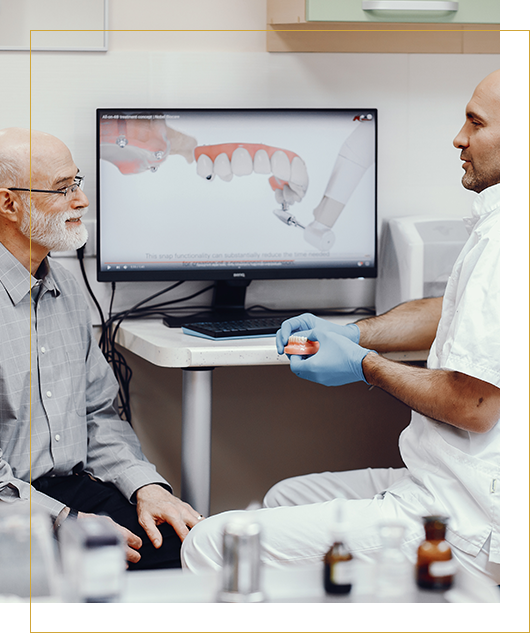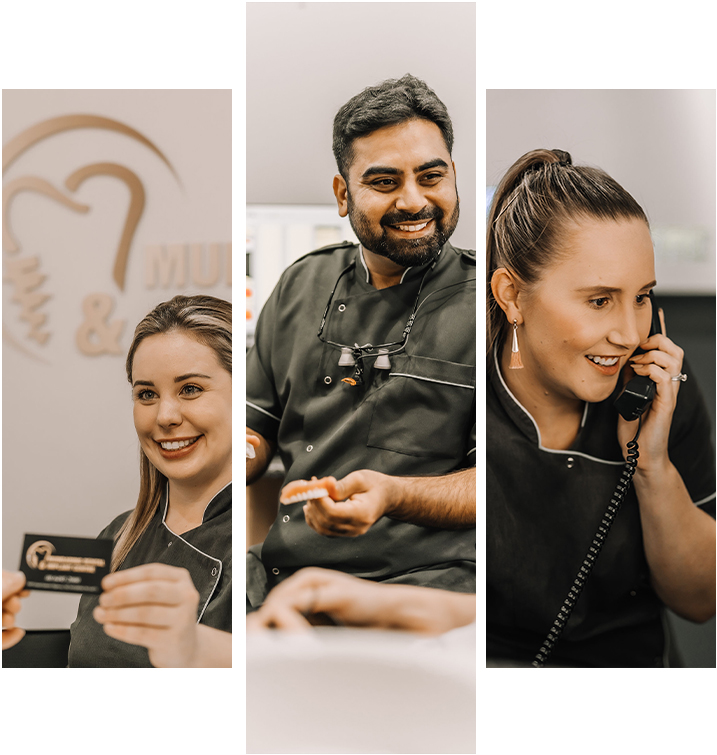All-on-4 Implants in Mundaring
The longer you wait to replace a missing tooth, the greater your risk of getting gum disease. With the All-on 4 implant procedure, you can have a new set of replacement teeth that will maintain your oral health; head to our office now and enjoy a lifetime of a radiant smile!


Get a Complete Set of Teeth with All-on-4 Implants in Mundaring
At Mundaring Dental and Implant Centre, we offer an All-on-4 dental implants procedure where four titanium fixtures are inserted into your upper or lower jawbone which is designed to replace a missing arch of teeth. Plus, we provide flexible payment options to give every patient access to quality dental care without breaking the bank. You’ll be able to smile confidently again and enjoy eating all your favorite foods without worrying about your artificial teeth slipping around or falling out. Don’t delay your dental problems. Call us today at 08 6495 2000, we’re excited to hear from you.
Reasons Why You Would Need All-on-4 Implants
Tooth loss can be a very painful and traumatic experience, but with our All-on 4 dental treatment in Mundaring, you get more than just your teeth back. Let’s take a look at some convincing reasons why you would need All-on-4 dental implants:

A More Permanent Teeth Replacement: If you are looking for a long-term alternative to your dental needs, then All-on-4 implants may be the answer. These durable and normal teeth replacements can provide stability for missing or artificial teeth without relying on adhesive materials that could fail over time, as conventional dentures do.
Speak Comfortably: All-on-4 implants are a great alternative to traditional full-mouth restoration. Once you’ve got them fitted into your gums, they feel and sound just like your original teeth, with the added benefit that there’s no need for any special treatment in between appointments!
You Can Fully Enjoy Every Bite of Food: The All-on-4 technique is a revolutionary way of restoring your ability to eat by leaving the roof of your mouth exposed. You can bite and chew more naturally with these dentures than with traditional ones because they leave no gap between tooth impressions, which means that food will be able to taste exactly how it should, not salty or metallic at all!

Why choose
Mundaring dental
& implant centre

Convenient Quality Dental Care
With over 50 years of combined experience, our team of professionals continues to provide high-quality dental services, from general dentistry and dental implant services to restorative and cosmetic dentistry.

A Compassionate Team Utilizing Modern Technology:
Mundaring Dental & Implant Centre offers the latest dental implant technology and techniques to provide you with the best possible results. Our state-of-the-art equipment makes your dental implant experience as easy and stress-free as possible.

Easily Accessible
Mundaring Dental & Implant Centre is proud to offer flexible payment plan options to make sure that everyone receives the dental care they need.

Same-day Dentistry and Fast Turn Around Time
Mundaring Dental & Implant Centre offers same-day service for various dental treatments, including dental crowns. You can get high-quality dental care and more natural-looking crowns in just one visit!
FAQs
What to Expect During an All-On-4 Implant Procedure?
To help you understand how an all-on-4 procedure can replace your partials, here is what to expect during surgery:
Evaluation and consultation
It is essential to schedule an appointment with an implant dentist so they can assess your case before proceeding with all-on-four implants. As part of your dental implant consultation, your dentist will examine your mouth thoroughly, as well as take X-rays and possibly CBCT scans.
With a visual inspection, your implant dentist can examine your gums and any remaining teeth, while the dental x-rays and the CBCT scan offer a better view of the underlying bone and tissues. In addition, your dentist will review your medical history, current medications, and any existing health issues to determine if you are a good candidate for oral surgery.
Near the end of your appointment, your dentist will give you a treatment plan. After you decide whether to proceed with treatment, your implant placement operation will be scheduled at a later date. Occasionally, a pre-op appointment will be scheduled to discuss dental sedation, preparation, and any medications that may be necessary to take.
Placement of implants
On the day of your appointment, it is advisable to wear comfortable clothes and close-toed shoes to the office. In addition, you will need a driver after the surgery because you will not be able to drive due to the sedation. Your implant dentist will administer dental sedation before the procedure.
Following anesthesia, your dentist will begin removing the remaining teeth. An incision will be made in your gums to gain access to your jawbone so that a mould can be made of the socket where the implants will be placed. Once the implant screw has been inserted into the jawbone, an abutment will be attached. It is also possible for your dentist to perform a bone transplant, which involves implanting bone material into the jaw bone.
Finally, the gums around the abutment will be sutured up, so the abutment is visible above the gum line. Four implants will be inserted in the upper arch, and four more in the lower arch. In the meantime, the temporary denture will be attached to the implants.
Recovery
Once your dental implants have been placed, the final step is to let them heal properly. After your dental implant surgery, you may experience some pain and swelling. In most cases, postoperative discomfort is minimal and treated with over-the-counter pain relievers.
To be effective, your dental implants must undergo a 3–6 month process called osseointegration, in which new bone growth bonds the implant to the surrounding bone. For a brief period, your dentist will put you on a soft food diet to prevent too much strain on the newly placed implants. Too much stress on implants too soon may cause them to loosen or heal incorrectly. Your dental specialist may begin treating you with permanent dentures only after osseointegration.
How Long Do All-On-Four Implants Last?
Possible Risks with the All-On-4 Implant Procedure
The success rate of implant dental procedures is high and the tooth replacement lasts for many years. However, there is a possibility of problems occurring, resulting in implant failure. The following are the most common issues that arise with All-on-4 dental implant treatment:
Loose implant: A loose implant is the most common type of complication. It can happen for several reasons. Rarely, the jaw bone is too weak to hold the implant, perhaps because of aging. A loose implant can also be caused by smoking, advanced gum disease, and poor oral hygiene. Consult a dentist right away if your implant comes loose.
Infection: Infection is a common problem that occurs with dental implants. Discomfort and fever may result from inflammation and infection at the implant site. Infections often develop soon after surgery. Make sure you follow your dentist’s post-op cleaning instructions and contact us if you notice any signs of infection.
Chronic Bleeding: An implant complication might cause chronic bleeding. It can induce everything from stomach distress to anemia. It is usually possible to stop the bleeding while keeping the implant in place with the help of your dentist.
Micro-movement: Implants can move or shift slightly. This is a minor issue that may go unnoticed. Teeth around the implant are tight or visible in the mirror when a micro-movement occurs. When this happens, an implant may be about to loosen. Consult with your dentist if this occurs.
An allergic reaction: Most implants are made of titanium. Patients rarely have an allergy to titanium screws or other metals. An allergic reaction causes a change in taste, tingling, swelling, and inflammation. Other materials are available if titanium alloy causes allergy symptoms. Replace the implant if needed. Please get in touch with our team at Mundaring if you think your implant caused an allergic reaction.
Damage to nerves: Implants positioned too close to nerves can cause damage. Nerve injury causes tingling in the tongue, gums, lips, and face. Even if the implant is removed, nerve damage may remain. Any risks, such as nerve damage, should be explained to you by your oral surgeon.
Protrusion into the sinus cavity: An upper jaw implant can sometimes extend into the sinus cavity. As a result, sinus irritation and other problems may occur, increasing the implant failure risk.
How Do I Know if I Am a Good Candidate for All-On-4?
Most patients will benefit from an All-on-4 dental implant procedure. You can find out if you’re a qualified candidate for All-on-4 dental implants by checking out this list:
Excellent dental health
A patient must be free from gum disease to be considered for All-on-4 implants. People who are prone to gum infections can still have the procedure, but the risk of implant failure is higher.
Good general health
All-on-4 candidates must be in good health to undergo the procedure. Various conditions can prevent the implants from fusing with the bone, essential to a successful restoration. A patient may not be eligible for implants if they have uncontrolled diabetes. In addition, those on antidepressants or receiving radiation therapy are at greater risk of implant failure and may not be candidates for All-on-4.
A healthy and sufficient bone structure
The dentist will perform a CT scan to determine the patient’s bone density. All-on-4 implants typically require less bone volume than regular implants, but the remaining bone must support the incoming implants. Patients will be informed if they require a bone graft procedure.
Non-smoker
Smoking compromises the ability of the bone to heal, which makes implant placement more difficult. Smokers who are considering this implant restoration need to stop smoking in the weeks leading up to the procedure and in the months that follow.
What Are the Pros and Cons of Having All-On-4?
Many people who have lost teeth have found comfort and confidence in All-on-4 dental implants, and this therapy has grown in popularity over the years. It has several advantages, including:
- It only takes four implants to restore an entire arch or teeth.
- There is only one surgery involved in the treatment.
- Deep insertion into the jawbone ensures that implants do not slip or loosen.
- Generally, All-on-4 dental implants eliminate the need for the time-consuming and painful bone grafting procedure.
- Once your mouth has recovered, there will be minor inconveniences to your everyday life and fewer food restrictions.
- All-on-4 dental implants are securely attached and do not cause rubbing pain like traditional removable dentures.
The disadvantages that come with All-on-4 implants include:
- Even though it is nearly impossible, there is a possibility of a failed implant. This happens when the bone around the implanted screw fails to develop properly.
- Following implant surgery, some people suffer from speech difficulty.
- All-on-4 dental implants are costly and may be out of reach for some people.
- During the healing process, All-on-4 implant surgery might cause tender gums and difficulty eating during the healing process.
As a result, before deciding on the All-on-4 dental implant invasive procedure, it is essential to know the procedure’s benefits and drawbacks. After reviewing your overall oral health, only a skilled and experienced dentist can recommend whether All-on-4 is the ideal way to restore your missing teeth.
How Much Do All-On-4 Dental Implants Cost in Mundaring?
An All-on-4 dental implant typically costs between $21,349 and $35,346 in Mundaring. This cost includes the first consultation, any procedures before surgery, the fitting of an acrylic denture, the post-treatment reviews, and x-rays.
